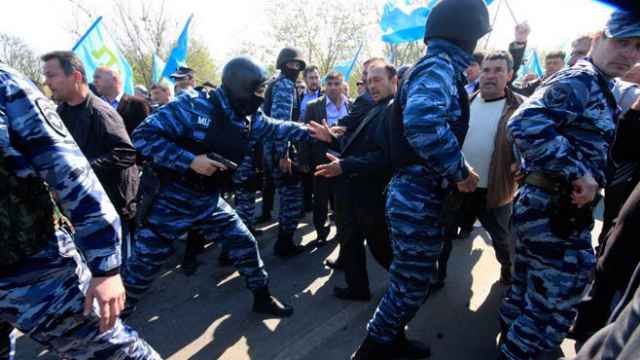A Crimean Tatar television channel has come under fire from Russian authorities for allegedly broadcasting content that borders on promoting extremism.
The channel, ATR, announced on air Wednesday that it had received a letter from the Russian Interior Ministry's center for combatting extremism, showing the contents of the letter to the camera so that viewers at home could see for themselves.
The letter said Russia's media watchdog had complained that the channel was "persistently presenting the idea of possible repression on ethnic and religious grounds, promoting the formation of an anti-Russian public opinion and deliberately fueling distrust among the Crimean Tatars toward the government and its actions, which indirectly holds the threat of extremist activity."
The channel — owned by a Russian businessman with Tatar roots, Lenur Islyamov — is now required to provide police with several official documents, including its registration, information on its personnel and the lease agreement for its headquarters.
It was unclear how long the channel was given to submit the requested documents.
The Crimean Tatar community has repeatedly been accused of extremism by authorities since Russia's annexation of the peninsula from Ukraine in March. The annexation was broadly opposed by the local Tatar community.
Both the current and former leader of the Mejlis, the Crimean Tatars' informal executive body, have been banned from the peninsula by prosecutors for allegedly displaying "signs of extremism."
Mustafa Dzhemilev, the former leader of the Mejlis, was banned from his home in late April and has warned since then that the peninsula's ethnic minority would face discrimination and harassment under the new authorities.
Refat Chubarov, the Crimean Tatars' current leader, was also banned from Crimea and has echoed Dzhemilev's warnings, referring to the new authorities as "occupiers."
The Crimean Tatars were deported en masse to Central Asia under Soviet dictator Josef Stalin in the 1940s and were only permitted to move back to their ancestral homeland in the 1980s when perestroika began.
Contact the author at [email protected]
A Message from The Moscow Times:
Dear readers,
We are facing unprecedented challenges. Russia's Prosecutor General's Office has designated The Moscow Times as an "undesirable" organization, criminalizing our work and putting our staff at risk of prosecution. This follows our earlier unjust labeling as a "foreign agent."
These actions are direct attempts to silence independent journalism in Russia. The authorities claim our work "discredits the decisions of the Russian leadership." We see things differently: we strive to provide accurate, unbiased reporting on Russia.
We, the journalists of The Moscow Times, refuse to be silenced. But to continue our work, we need your help.
Your support, no matter how small, makes a world of difference. If you can, please support us monthly starting from just $2. It's quick to set up, and every contribution makes a significant impact.
By supporting The Moscow Times, you're defending open, independent journalism in the face of repression. Thank you for standing with us.
Remind me later.





